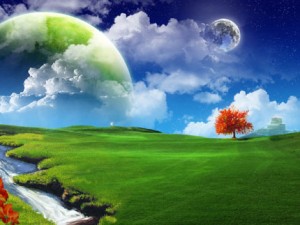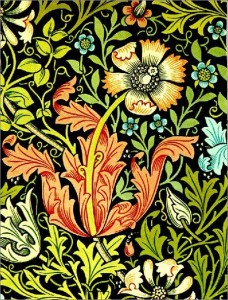The Economy of Poetics
On the Virtues of Self-Sustaining and Simple Living
by V.I. Postnikov
“Let the beauty we love be what we do.” – Rumi
“The environmental crisis is the crisis of aesthetics.” – James Hillman
“The poet knows of no ‘waste’…. Ecopoetics is the way of thinking economically.” – Hwa Yol Jung
 It is the right time for poets and artists to engage in economics. We can’t allow the greedy and self-important “experts†and “economists†to push the world to the brink of catastrophe. A lot has already been written and said about the impending collapse — I won’t repeat it.
It is the right time for poets and artists to engage in economics. We can’t allow the greedy and self-important “experts†and “economists†to push the world to the brink of catastrophe. A lot has already been written and said about the impending collapse — I won’t repeat it.
The idea is that the systemic collapse could be prevented, or, at least, alleviated, by invoking an inner artist in everyone and directing the artistic creativity to the dismantling of the Mega-Machine. Roughly speaking, in order to survive, we need to decentralize the economy as soon as possible by reducing it to an individual craftsmanship. I understand all the objections and losses involved, even fierce opposition, but the gains are superlative. Ultimately, people will see it as the only strategy, whether pre- or post-collapse.
Previously, I appealed to scientists and engineers, seeking help from their expertise in dismantling the modern infrastructure and lowering the risk of collapse; probably, I was naive.
In fact, the idea of an economy of poetics is simple and borrows much from the so-called alternative economics of noted figures such as E.F. Schumacher and Wendell Berry. And by “poetics†I mean the extended notion of poetry, comprising arts, music, etc; notably, any artistic work. The etymology of the term “poetry†comes from the Greek poiesis which means “making, or creating.†Semantically, it is close to the term oikos (root of ecos, ecology) which means “household.†A household, or the ecosystem, involves creativity, and, like good poetry, the home should be beautiful and harmonious.
The core premise of the economy of poetics is thus the assumption that the artist, more than anyone else, feels the aesthetic satisfaction from his/her work, and is able to create sustainable living. “Poetry,†as Martin Heidegger has said, “is what causes dwelling to be dwelling. Poetry is what really lets us dwell. But through what do we attain to a dwelling place? Through building. Poetic creation, which lets us dwell, is a kind of building.†And, as an elder of the Findhorn Eco-village, artist and permaculture teacher, Craig Gibsone says, “There is no sustainability if it’s not fun.â€
Thus, I came to the conclusion that it is poets and artists who may be the driving force in the transition to a new economy (to be sure, with many other fellow travelers). Gradually, the rest of the population (or enough of it) will be drawn into the movement — because inherently everyone is an artist.
In short, the basics of the economy of poetics is this: everyone has to invoke an inner artist to begin the dismantling and transformation of the wasteful globalized economy and its infrastructure into his, or her, personal work of art (engineers should change their heart and provide the assistance). I take it that we have already accumulated (more than) enough material and tools for to begin perestroika of the environment. And under “environment†I mean the immediate space of everyone’s personal environment, both inner and outer.
As soon as the idea of artistic transformation will settle in each of us, the necessity of buying things, produced by unknown others (largely, machines) immediately ceases, and becomes even repulsive. (Nonetheless, barter is necessary among friends. This is the key aspect of any community). You begin creating new things out of the obsolete, useless, or harmful, according to your artistic taste (acquiring besides the material result, the aesthetic satisfaction and expertise). You become an artist, master, not a consumer. With practice, you get the needed skills and knowledge. You become self-sufficient, unique, indeed, a master of your life.
Universality of skills
William R. Catton (author of the famous Overshoot), in his latest book Bottleneck (2009), argues that the differentiation of skills, in fact, “seriously diminished self-sufficiency of individuals and local groups … alienated us from one another, and enabled societies to outgrow the planet’s life-support systems.†As soon as we take the economy, take it literally into our own hands — all economic life will change. Everyone will create what he or she cherishes most, or is able to do. These can be paintings, sculptures, furniture, baking bread, growing vegetables, building eco-houses, etc. No more need to import things or buy fashionable clothes, or products from abroad, produced by unknown people (and machines) which ultimately we don’t need at all. No more need to watch TV. Instead, we learn to play music ourselves, in the circle of friends. The amount of material production is drastically reduced. All economy reduces and shifts to a local, individual level of the artist. The worst of collapse is canceled.
History has already seen such attempts to organize artistic communities. As Joy Thacker writes in the 2001 essay “Artistic Visionaries”: “Art schools seem to have been hotbeds of radicalism down the years, throwing up individuals who  would not only try to change the face of art, but also the face of the world…. William Morris (1834-1898), perhaps best known now for his wall-paper designs, was thought of most highly by the public as a poet…. His legendary work rate and breadth of interest and imagination led him to work in many fields: interior design, furniture making, tapestry work, dyeing, embroidery, architecture, stained glass, tiling, painting, illustration, book design, typography and printing.†Morris had many followers in the Arts and Crafts Movement; their lives and ideas still fascinate the mind. They echo in the writings of Oscar Wilde, and in past and present artistic visionaries. Yet today we badly need a revolt against the mediocrity and aggressiveness of the Industrial Machine not only on aesthetic grounds, but as a radical means to save humans and nature from self-destruction.
would not only try to change the face of art, but also the face of the world…. William Morris (1834-1898), perhaps best known now for his wall-paper designs, was thought of most highly by the public as a poet…. His legendary work rate and breadth of interest and imagination led him to work in many fields: interior design, furniture making, tapestry work, dyeing, embroidery, architecture, stained glass, tiling, painting, illustration, book design, typography and printing.†Morris had many followers in the Arts and Crafts Movement; their lives and ideas still fascinate the mind. They echo in the writings of Oscar Wilde, and in past and present artistic visionaries. Yet today we badly need a revolt against the mediocrity and aggressiveness of the Industrial Machine not only on aesthetic grounds, but as a radical means to save humans and nature from self-destruction.
It is obvious that the ideology of social differentiation and “top-down†expert education must be replaced by universality of skills and general artistic education. The genuine education begins when one starts working creatively with his/her own hands. Only then.
Poetry and science: relations
The similar philosophy of self-sustaining economics and simple living has been championed by the great Russian writer and thinker Leo Tolstoy. He was particularly wary of the immoral science that destroyed life and nature. The venal liaison between science, technology, and corporations has long been an agenda-item of radical thinkers, but today it has acquired particular acuity. What is badly needed is the re-thinking of science. There have been brave attempts to liberate science from the fetters of orthodoxy, anthropocentrism and free market, and bring it closer to ecology and poetry. However, the minds of too many scientists are still intoxicated by formulas and mathematical models rather than scared by frightful consequences of their “applications.â€
And lastly: It is understood that we must learn from others, even though our creativity is restricted by the freedom of others. But artists should find their common language, because they value and understand the work of art. And nature, of course, remains their greatest teacher. Only then can we, in the words of Oscar Wilde, “realize the perfection to our own incomparable gain, and to incomparable and lasting gain of the whole world.†And, probably, divert much of the catastrophe.
Victor Ivanovich Postnikov, born in 1949 in Saint-Petersburg, Russia, is a poet-translator, writer, and (left) biocentrist. A former research scientist and educator (DSc in Electrodynamics, 1992), after the collapse of the Soviet Union he gave up his scientific career in favor of radical ecology and poetry. The acquaintance with deep ecology has brought him to the camp of ecocentrists around the globe. Since 2009, he has been an editor of the online journal Dandelion Times (in Russian). He can be reached at vpostnikov (at) yahoo.com. {This article originally appeared on Culture Change, and is reprinted here by permission.}

The Economy of Poetics http://t.co/BPPHeBc
1